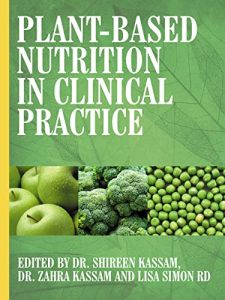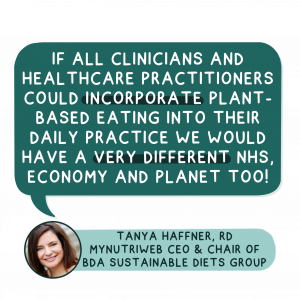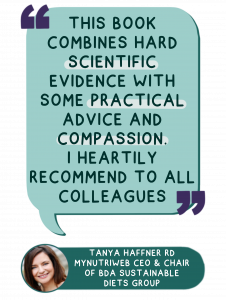By Dr Shireen Kassam, Lisa Simon RD and Dr Zahra Kassam



Unhealthy diets are now the leading cause of chronic ill health and premature death, and our food system is a leading driver of both the climate and ecological crisis. A transition to a plant-based diet is now considered essential if we are to meet our climate and nature commitments, with clear co-benefits for improving individual and population health. A healthy plant-based diet is effective for reducing the ris k of many of our commonest chronic conditions, such as heart disease, type 2 diabetes, certain cancers and for maintaining a healthy weight. It can also be very effective in the management and treatment of established disease. Yet most health professionals are unfamiliar with how to adopt a healthy plant-based diet, let alone support their patients to do the same. Eating a diet centred around fruit, vegetables, whole grain, beans, nuts and seeds should be straightforward, given that many traditional diet patterns are based around these foods. Yet, modern diets are now far removed from this way of eating, being heavy in animal-derived and processed foods and insufficient in fibre and whole plant foods.
k of many of our commonest chronic conditions, such as heart disease, type 2 diabetes, certain cancers and for maintaining a healthy weight. It can also be very effective in the management and treatment of established disease. Yet most health professionals are unfamiliar with how to adopt a healthy plant-based diet, let alone support their patients to do the same. Eating a diet centred around fruit, vegetables, whole grain, beans, nuts and seeds should be straightforward, given that many traditional diet patterns are based around these foods. Yet, modern diets are now far removed from this way of eating, being heavy in animal-derived and processed foods and insufficient in fibre and whole plant foods.
We each adopted a plant-based diet for a variety of reasons and had similar experiences of having to educate ourselves on the scientific evidence and clinical application, despite being qualified doctors and dietitians at the time. We subsequently started to incorporate this knowledge into our respective clinical practices and realised that, with the right support, patients were very open to adopting a plant-based diet and were reaping the benefits. At the time, certainly in the UK, there seemed to be a lack of credible resources on the topic for undergraduate and postgraduate healthcare courses, despite clear support from the British Dietetic Association (BDA).

With our newfound knowledge and confidence in plant-based nutrition, we came together to produce the textbook we would have wanted to read when we first adopted a plant-based diet. Plant-Based Nutrition in Clinical Practice is an evidence-based, edited book aimed at health professionals and provides an up-to-date review of the uses, benefits and practical application of a plant-based diet in clinical practice, taking both a holistic and a systems-based approach. This multi-author book contains chapters that cover the abundant evidence for the beneficial impact of plant-based nutrition on the chronic diseases of our time, its impact at all stages of life, the barriers and strategies for behaviour change, and the growth of the evidence-based specialty of Lifestyle Medicine. The book concludes with a chapter on how our food system is in fact a central driver of our current planetary health crises, with root causes that are common to our health crisis, and how a shift to plant-based nutrition can help mitigate them. You can take a look inside the book here.
If all clinicians and healthcare practitioners could incorporate plant-based eating into their daily practice we would have a very different NHS, economy and planet too! This book combines hard scientific evidence with some practical advice and compassion. I heartily recommend ‘Plant-Based Nutrition in Clinical Practice’ to all colleagues and anyone interested in changing the way we eat for all our sakes. – Tanya Haffner, RD and CEO of MyNutriWeb
 Published by Hammersmith Books, it has been available in the UK since September 2022 and will be available globally later this year. We have made the book as affordable as possible, and the eBook is half the price of the print version.
Published by Hammersmith Books, it has been available in the UK since September 2022 and will be available globally later this year. We have made the book as affordable as possible, and the eBook is half the price of the print version.
We hope this textbook will provide a valuable resource to everyone wanting to adopt a plant-based diet and for health professionals who not only want to educate themselves but want to help support their patients to make positive dietary changes. Our vision is that it will be incorporated into University and Medical School libraries, ultimately making its way onto reading lists for a broad variety of healthcare courses.







Sounds like an interesting book. There is so much confusion about what plant based is but largely recommendations that advise plant-based eating are actually talking about flexitarianism (upweighting plants within the diet) which is likely to be more acceptable to more people. Before I buy this book, which definition is being used for this book and is it plant based or plant only diets you are covering? Had a read of the blurb but its not clear
Reply from author: Thank you
We cover mainly fully plant based or predominantly plant based diets but do include information on the DASH Mediterranean and other therapeutic diets. We discuss the role of animal foods as relevant to eat disease type but overall. Hope that makes sense.
Further to this: most of the first chapter is free on the publishers website so you may like to look at it here
https://www.hammersmithbooks.co.uk/product/plant-based-nutrition-in-clinical-practice/
hi we are truly new to plant base foods its truly I feel based on the Bible for the Bible truly tells us what to eat…But is there a plant base recipe book written by u?
Hi. There are recipes on the plant-based health professionals website and also lots of recipes as part of their 21 plant based health challenge. Many thanks.
Thx